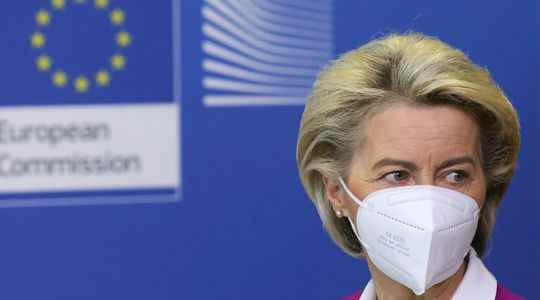How to give food for thought to conspiracy theories on anti-Covid-19 vaccines? Messages exchanged between the President of the European Commission, Ursula von der Leyen, and the CEO of the Pfizer laboratory, Albert Bourla, raise many questions, which will undoubtedly remain unanswered.
In interview given to New York Times in April 2021, the former German Minister of Defense explained that she had discussed with the Greek CEO for a month, at the same time, while the contract negotiations for the purchase of 1.8 billion doses of vaccines, for a amount of 35 billion euros, were in progress. . The peculiarity of this contract, concluded in May, is that it increased the cost of the dose from 15.50 to 19.50 euros, an increase of a quarter of the price, which is hardly a brilliant result given the quantity ordered… Despite this admission, she refused to reveal the content of the messages to the journalist.
Indeed, the European executive, which was in charge of negotiating the purchase of vaccines on behalf of the Member States, agreed to send him three documents (an e-mail, a letter and a press release) but no SMS. The journalist from the American daily then made a request for access to these exchanges as well as to the documents relating to the conclusion of this huge contract. Faced with a refusal from the Commission, considering that these SMS are not part of the documents recorded by the institution, the journalist turned to the EU ombudsman, Emily O’Reilly, who opened an investigation in September 2021. .
Lack of transparency
The latter stepped up to the plate against Ursula von der Leyen and the European Commission in its conclusions summarized in a press release released on Friday, castigating the non-transparency of the institution on the subject. “The limited way in which this request for public access to documents was handled means that no attempt was made to identify whether the texts in question existed. This way of acting does not meet expectations for transparency and administrative standards within the Commission,” she wrote.
Irishwoman Emily O’Reilly then requested that Ursula von der Leyen’s cabinet carry out “further research” in order to find these messages and assess whether their content can be revealed in accordance with the transparency rules applicable to documents of the EU.
“When it comes to the public’s right of access to EU documents, it is the content of the document that matters, not the medium or the form. If the text messages relate to EU policies and decisions, they must be treated as EU documents.The EU administration must update its procedures for registering documents to be in line with current practices, she continues. of the EU is a fundamental right”.
Land for disinformation
The Ombudsman then called for an evolution in terms of transparency: “Although this is a complex issue for various reasons, the administrative practices of the EU should evolve and be in line with the world in which we live. and with the communication tools we use today”. She has given the Commission until April 26 to respond to her recommendations, which are however not binding.
In a speech delivered the day before in Brussels on the theme “Transparency and participation in the face of scientific uncertainty”, Emily O’Reilly insisted on the need for frankness and transparency with the public, while distrust of information concerning the pandemic continues to grow.
“In such a complex decision-making environment, public authorities must be candid with the public. Only by doing so – by declaring that their decisions are based on the best advice available, but by recognizing that this advice can change and by being transparent when they do – that they can really inspire public confidence and avoid misinformation,” she said. And to abound: “The absence of total transparency has become fertile ground for speculation.”
“This case is more important than a simple exchange of SMS,” said Dutch MEP Sophie in’t Veld (Renew Europe). “The European Commission has become less transparent, less accountable to the European Parliament and frankly more disconnected from European democracy,” she denounced, calling on the European Parliament to react.
A second “SMS gate” for Von der Leyen
The case poses a real problem of confidence in the President of the European Commission, especially since she has already found herself embroiled in a similar controversy, recall various media, including the Dutch daily From Telegraaf.
Ursula von der Leyen was then Minister of Defense under the governance of Angela Merkel and had been under investigation by the Bundestag committee concerning consultancy contracts awarded by her ministry for an amount of 200 million euros , with external consultants.
During its investigation, the commission discovered in December 2019 that all data from Ursula Von der Leyen’s mobile phone had been erased a month after she left the government. She was eventually acquitted of the misconduct charge, but the issue of transparency remains the same.
